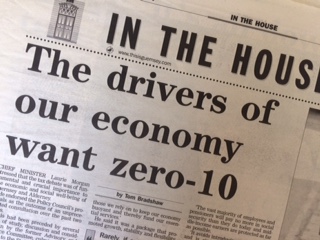Over a decade after Guernsey’s adoption of a “zero-10” corporate taxation system, that system continues to be under scrutiny from the EU. In late 2017, Guernsey committed to respond to EU insistence that companies operating in Guernsey have “substance”, as described here. If in the process this entails a new system of taxation, as seems possible, that new system could look like “territorial 10” (more information on which can be found here).
These developments are important because Guernsey does not want to be on a “blacklist” of non-cooperative jurisdictions which closes the doors of the EU (which currently includes the UK ) to Guernsey’s financial services industry. For now, we are permitted to sit on the naughty step, pending better behaviour.
So while we contemplate our fate, it is worth remembering how and why we got zero-10 in the first place. Understanding the history should help the debate to come on any future system.
The first thing to appreciate is that this history is longer and subtler than some recent headlines imply. Well over a decade ago, Guernsey’s corporate tax regime was subject to review by the EU, along with those of Jersey, the Isle of Man and a host of other jurisdictions both inside and outside the EU. The EU’s findings were that Guernsey’s then-20% rate of corporation tax, because it simultaneously allowed a large range of exemptions for non-residents, was “unfair tax discrimination”.
Guernsey knew that without the exemptions, financial services were finished. In fact the subplot, some would tell you, was indeed to close down financial services in the island, alongside a host of similar jurisdictions.
In response and behind closed doors, Guernsey together with Jersey examined the alternatives. Various structures and rates of corporate tax were reviewed in some detail. But then the Isle of Man decided to steal a march and, somewhat precipitately, announced a zero rate of taxation. Forced to bow to competitive pressures, Guernsey and Jersey followed suit. The prior “carve-out” of zero suddenly became the new norm, and a small handful of businesses would be levied tax at a higher rate of 10% or, in the case of utilities, 20%. What has become known as “zero-10” was born.
The move almost certainly took the EU by surprise. However, their technical requirements were met and so the tests were passed. The EU was seen off, at least for a bit.
This created an issue back at Frossard House, however. Having limited corporate tax take created the now-infamous “black hole”. No matter, we were told at the time. Economic growth would fill in the hole in fairly short order.
We all now know, with the benefit of hindsight, that this didn’t happen. Growth did not occur as expected, or even very much at all. Higher taxes, mostly personal and indirect, and some overdue constraint on public spending closed the gap instead. But those higher taxes have pressured household budgets and chipped away at Guernsey’s international attractions in other ways.
Some of those higher taxes have come in the form of a widening of the 10% corporate tax net. The initial, small, handful of exceptions have burgeoned – to the point that the new arrangement favouring outsiders looks much like the old. The only meaningful difference is that the base rate of tax is now zero, with a whole range of uplifts, rather than 20% with a large array of reductions.
The OECD and the EU have indicated that zero isn’t per se a problem. The reality, however, is that zero sticks in the EU’s gullet, as do the Crown Dependencies’ successful financial services industries more generally.
The implication is that any solution to the problem seems unlikely to include zero as a long term base rate of corporation tax. As examined elsewhere (see here), this may be as much of an opportunity as a threat.







